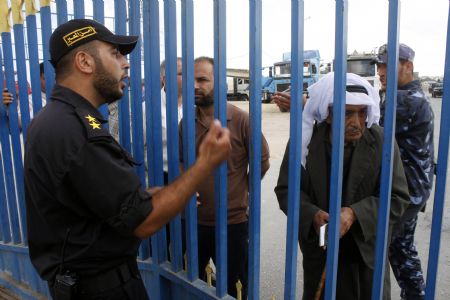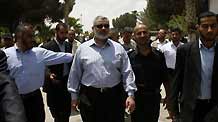Hamas Proposes Shared Mechanism to Operate Rafah Crossing
Adjust font size:
 |
|
A Hamas policeman stands guard as Palestinians wait to cross into Egypt through the Rafah border crossing in the southern Gaza Strip, on June 27, 2009. The Egyptian authorities reopened, partially, the Rafah crossing at the border with the Palestinian territory of Gaza Strip on Saturday for three days. [Xinhua]
|
The deposed premier of Hamas administration in Gaza Ismail Haneya proposed on Saturday a joint mechanism to keep Rafah border crossing working permanently.
Haneya visited and toured earlier on Saturday the key border crossing between Gaza Strip and Egypt, which was temporarily reopened by Egypt for three days for students, patients and Palestinians holding other nationalities.
He called for the approval of a joint Palestinian, Egyptian and European mechanism to keep the crossing permanently working between the impoverished enclave and Egypt.
"We still cling to the offer and we are ready to operate the crossing of Rafah depending on the political partnership as well as the Palestinian-Egyptian partnership with a European presence at the crossing," Haneya told reporters.
Thousands of Palestinians, including students, patients who need medical treatment and residents who hold other nationalities will cross through Rafah border crossing to Egypt on Saturday, Sunday and Monday.
"We welcome the presence of European inspectors, the Egyptians and the Palestinian presidential guards in addition to the presence of the (Hamas) government in Gaza," said Haneya.
Rafah crossing has been closed for more than two years since the radical Hamas movement seized control of the enclave in June 2007. The movement's militants routed western-backed President Mahmoud Abbas's security forces.
The crossing used to be run by Abbas presidential guards under European Union inspectors' observation. When Hamas seized control of Gaza, the EU inspectors left and Abbas presidential guards were dismissed by Hamas authorities.
"We believe that it is the best mechanism to resume operating the crossing permanently instead of temporarily for a few days," said Haneya.
Israel and Egypt had agreed that Rafah border crossing won't be opened until captive Israeli soldier Gilad Shalit is released.
To ease the restrictions imposed on one and a half million Palestinians in the Gaza Strip, both Egypt and Israel had frequently reopened crossings for humanitarian aid as well as for people's movement.
"The suffering of the Gaza Strip population is very big, therefore the policy of siege and aggression on our people should immediately be stopped," said Haneya.
(Xinhua News Agency June 28, 2009)
